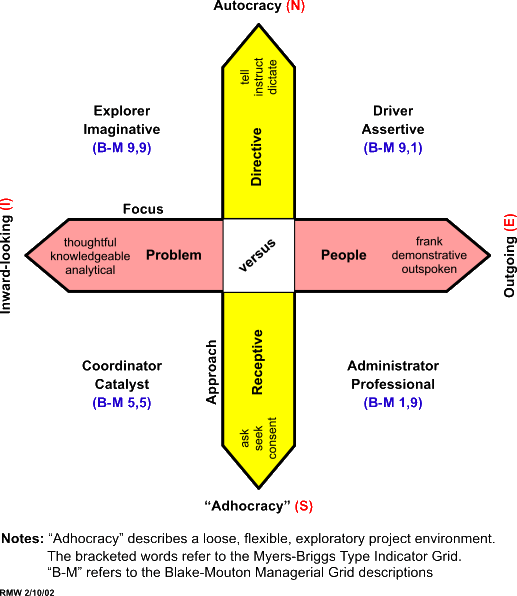Project Management Style and Personality Traits
In the March 1996 issue of the PMI Journal, Kliem and Anderson discussed the
project manager's style or approach toward team-building as a key variant in
managing projects successfully.[12] They
observed that "Only recently has the influence of the project manager's
personality on project performance received recognition."[13]
They identified four primary styles in how a person approaches relevant work
situations and applied this to the processes of planning, organizing, controlling
and leading.
Kliem and Anderson concluded that "Knowing the type of [project] environment
and the team-building style [required] of the project manager increases the opportunities
for selecting the right person for the position ...".[14]
Unfortunately, the descriptors they used are not terms familiar to most project
management people.
To bring more recognizable and practical utility to the issue of project leader
selection, a six-step analysis was undertaken.[15]
The analysis commenced with a review of the last ten years of PMI publications
to abstract familiar words or phrases used to describe a project manager's required
personal characteristics and skill sets. The selection excluded words depicting
technical experience or know-how. The result was a list of some 200 words or
phrases and, not surprisingly, implied that the leader of a project should be
an impossible paragon of virtue.
The next step involved a literature review of personality typology and selecting
those dominant types most relevant to the project management environment. This
was based on two dimensions of "Focus" versus "Approach"
as shown in Figure 4. This provided four "types"
to which familiar but differentiated project leadership titles could be assigned.
The list of words or phrases were then subjectively assigned to each title, except
those that plainly referred to all four types.

Figure 4: Identification of Project Manager's Style
Subsequent steps involved subdividing each group into either inherent personality
traits or learnable skill sets, and matching these word sets across the four
project management types to provide a cross-check and some degree of uniformity.
In the final step, the word groupings were further subdivided into the management
processes of planning, organizing, executing and controlling.
Of course, the propensities and skills of individuals never fit these descriptions
exactly. Nor, for that matter, are projects ever that simple. But the arrangement
does begin to show a correlation between personal characteristics and the realities
of different project management environments.
The data is provided in the paper referenced above, but it is also available
in the form of a two-part questionnaire for those who would like to conduct a
self-examination.
Table 4: summarizes the characteristics and skill sets
of the four types of project leader.[16]
|
|
Explorer
|
Coordinator
|
Driver
|
Administrator
|
|
Characteristics:
|
|
Planning
|
Vision oriented
|
Mission oriented
|
Goal oriented
|
Objective oriented
|
|
Organizing
|
Solution seeker
|
Conflict mediator
|
Solution enforcer
|
Conflict solver
|
|
Executing
|
Inspiring
|
Understanding
|
Hard driving
|
Analytical
|
|
Controlling
|
Determined
|
Free form
|
Rigid
|
Flexible
|
|
Skill Sets:
|
|
Planning
|
Focus long range
|
Focus on participation
|
Focus short range
|
Focus on solutions
|
|
Organizing
|
Evokes dedication
|
Obtains willing effort
|
Gets early results
|
Harmonizes effort
|
|
Executing
|
Leads by example
|
Develops commitment
|
Uses partnerships
|
Reinforces commitment
|
|
Controlling
|
Takes major decisions
|
Reaches closure
|
Makes most decisions
|
Implements decisions
|
Note: These words and phrases have been taken from the
larger word sets that represent each cell as presented in Appendices A and B
of the fourth Paper in our series: "Dominant Personality Traits Suited to
Running Projects Successfully - And What Type Are You?"
Table 4: Project Leader Types, Characteristics, and Skill Sets
12.Kliem,
Ralph L. and Harris B. Anderson, Teambuilding Styles and Their Impact on Project
Management Results, PMI Journal 27(1), 1996, pp. 41-50.
13. Ibid., p41.
14. Ibid., p50.
15. Wideman, R.M., Dominant Personality Traits Suited to Running
Projects Successfully, and What Type are You?, Project Management Institute Seminar/Symposium, Long Beach, CA, 1998.
16. Ibid., abstracted from Tables A and B
|



